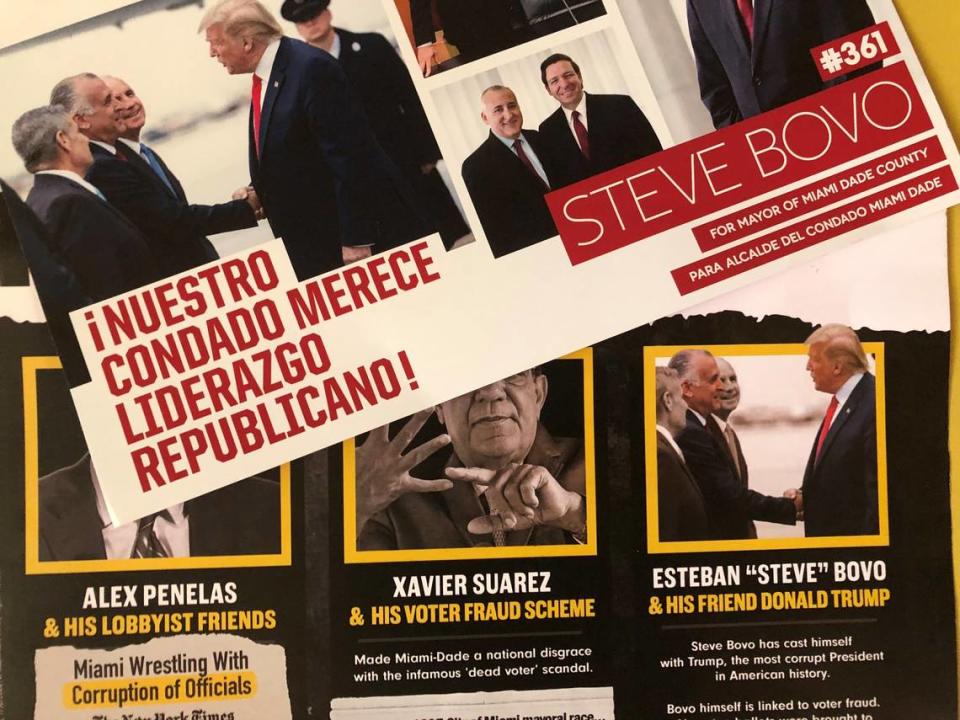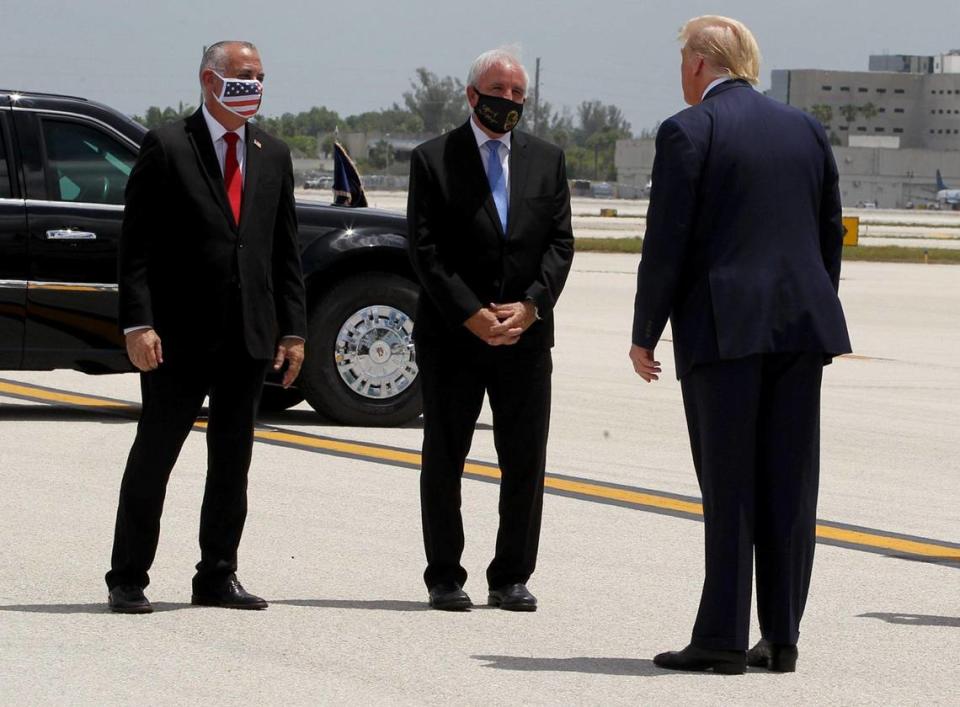A Republican and a Democrat are running for county mayor, and Trump’s along for the race
For a hint at the role President Donald Trump will play in the non-partisan election for Miami-Dade mayor, look at the tarmac photo of him greeting mayoral candidate Esteban “Steve” Bovo after an afternoon squall at Miami International Airport on Jan. 23.
The photo features prominently on a mailer the Republican county commissioner’s campaign sent voters this summer ahead of the Tuesday primary that vaulted him and fellow County Commissioner Daniella Levine Cava, a Democrat, into a fall runoff to decide who succeeds a term-limited Carlos Gimenez.
The exact same photo, with Trump in a red tie shaking hands with a beaming Bovo, had another prominent spot in the summer campaign: on a Levine Cava mailer attacking “Bovo and his friend Donald Trump.”

Miami-Dade’s charter bars partisan primaries for electing mayor, and it’s against the law to place an R or a D next to a candidate’s name in non-partisan races for county offices.
But with Bovo and Levine Cava using Trump to secure their spots on the fall mayoral ballot, Miami-Dade’s political combatants are bracing for the most partisan non-partisan race in county history.
“This mayor’s race will be a proxy for the presidential race,” said Fernand Amandi, a Democratic pollster and campaign consultant in Miami. “This will be the first time it’s going to be experienced purely on those terms.”
The first self-declared victim of partisanship in the 2020 mayoral race is Alex Penelas, a Democrat and former two-term mayor who positioned himself as a moderate option over Bovo to the right and Levine Cava to the left.
Though Penelas held a commanding lead in fundraising and in endorsements from city mayors, he finished third with 25% of the vote to the 29% won by Bovo and Levine Cava.
“I don’t want Miami-Dade to become another Washington, D.C., where nothing gets done because of partisan gridlock,” Penelas said in a phone interview Wednesday after participating in a food drive in Hialeah. “But it’s the new ticket. It’s the new formula for success. You run to one extreme.”
Bovo went into the campaign with backing from most of Florida’s Republican establishment, including hundreds of thousands of dollars raised by outgoing Florida Speaker of the House José Oliva and phone banking from longtime friend U.S. Senator Marco Rubio, a Republican from West Miami.
The only Republican contender in the six-person contest that ended Tuesday, Bovo hit Levine Cava for being too far left for Miami-Dade, calling a paid sick-leave proposal for county contractors something out of “Bernie Sanders world.”
Motivated voters
Both parties were relatively energized for the race, with Republican turnout surging to 36% from the 29% showing in the August 2016 primary that sent Gimenez cruising to a second term against challenger Raquel Regalado, a fellow Republican.
Democrats were energetic this summer, too, with a 32% turnout in August compared to 23% four years ago. Turnout in November should top 70%, as it did in 2016, when Hillary Clinton beat Trump in Miami-Dade by almost 300,000 votes.
With a flood of Democratic voters on Election Day, Bovo will have to fend off Levine Cava’s efforts to brand him an extension of Trump. In the first full day of the runoff election, Bovo said he wanted the race to be about county government and not partisanship.
“For a while now the county has been moving in a direction where it’s trying to be a lot to a lot of people, and it fails in its core mission,” Bovo told NBC 6 Wednesday morning. “That’s what this campaign is about.”

Precinct data from the more than 400,000 ballots cast in the six-person mayoral race show how Bovo’s consolidation of Republican support allowed him to come out narrowly ahead in a primary where Democrats cast 47% of the ballots to Republicans’ 34%.
In the 63 precincts where at least 45% of the voters were Republicans, Bovo ran up the score with 52% of ballots cast. Penelas, a fellow Cuban-American who counted on a respectable Republican showing in 2020, won 20% of the vote in the GOP-heavy precincts. That’s not too far ahead of the 16% that Levine Cava won.
Penelas won mayors’ endorsements
Penelas won the endorsement from Hialeah Mayor Carlos Hernandez, a Republican, one of 11 mayors backing him. But Bovo won the battle in the Republican-leaning area, taking nearly 60% of the ballots cast in county precincts assigned to the city. Penelas, a former Hialeah City Council member, won about 24% of the votes there.
Results from Miami Gardens show the room to grow for Levine Cava as she heads into the fall campaign in a county with about 220,000 more Democratic voters than Republican voters.
In Miami Gardens, the advantage is much more lopsided. Democrats make up 73% of registered voters in the city, and Levine Cava and Penelas tied there with 34% of the vote.
Countywide, Levine Cava and Penelas split the blue vote, too. In the 230 Democratic precincts, Levine Cava led with 37% and Penelas took 30%, followed by first-time candidate Monique Barley’s 12%.
Christian Ulvert, the Levine Cava campaign manager, said Democratic enthusiasm in Miami-Dade for blocking a Trump second term will be an asset for the county mayoral candidate, too.
“We are entering what’s going to be the most partisan presidential race the country has ever seen,” he said. “And there’s no doubt our operation is going to tap into that.”
Miami-Dade Republican Party Chairman Nelson Diaz said comparing the race to a partisan election ignores an important fact: There is no “R” or “D” next to either candidate’s name on the ballot.
“The way people vote [in a non-partisan race] is different than in a congressional race,” he said, adding that, unlike August, when the mayor’s race was the biggest event on the ballot, the presidential campaign will dominate media attention. “There’s other factors that will influence how people vote, and it’s not party.”
Penelas, a former Univision political commentator, expects both candidates to moderate their positions in November, when more than 1 million people are likely to vote, including hundreds of thousands of voters without party affiliation.
“You’ll have a lot more independents voting in November. I’d expect the commissioners to moderate themselves,” he said. “If they don’t, it’s going to be tough.”
Penelas said that people have asked if he will endorse either Levine Cava or Bovo, but he has not heard from anyone officially involved. He says he doesn’t know if he will support either candidate. He also said he hasn’t given it much thought — and doesn’t believe it matters.
“Who cares who Alex Penelas endorses?” he said.

